- Explore Our Cardiac Diagnostic & Imaging Services
Advanced Heart Imaging
for Better Health
- Early Detection
- Skilled Cardiologists
- Timely Reports
- Quality Care
We don’t just diagnose;
we reveal the true story of your heart.
At CARDIS, we’re dedicated to more than diagnosing heart conditions. We offer personalized treatments tailored to accelerate your recovery and enhance your heart health. Understanding each heart’s journey is unique, we customize our approach to meet your specific health goals.

Dr. R. Padmanabhan Iyer
Cardiology Consultation
A cardiology consultation is usually requested by your family doctor to find, treat, and prevent diseases of the heart and blood vessels.
Duration
30 - 45 mins
Preparations
Bring all prescription medications for review. Avoid perfumes, colognes, or scented lotions. No dietary restrictions; continue medications unless advised otherwise. Arrive 10 minutes early to register.
Expectations
Cardiac consultation requests must be made by a referring physician, who will provide the necessary medical information for a thorough assessment. Based on the consultation and test results, the cardiologist may recommend additional tests or a follow-up appointment, where they will explain results, prognosis, and treatment plans. A cardiac re-assessment may also be requested to review progress and adjust the treatment plan as needed.
Results
The results will be reviewed and reported by a cardiologist. The final report will be sent to your family physician.
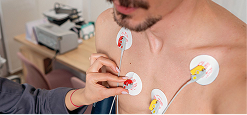
Dr. R. Padmanabhan Iyer
Electrocardiography (ECG/EKG)
A simple, painless test that monitors and records cardiac activity and rhythm of the heartbeat using the heart’s electrical signals.
Duration
15 - 20 mins
Preparations
Bring all prescription medications for review. Avoid perfumes, colognes, or scented lotions. No dietary restrictions; continue medications unless advised otherwise. Arrive 10 minutes early to register.
Expectations
Your doctor may order this test if you are experiencing abnormal heart beats (palpitations) or if you are having chest pain. An electrocardiogram is a safe and painless test done while you are lying face-up on an examination table. In preparation, a technician will place receptors on your chest, arms, and legs. Electrodes and a monitor will be attached to your chest to acquire the ECG.
Results
The results will be reviewed and reported by a cardiologist. The final report will be sent to your family physician.

Dr. R. Padmanabhan Iyer
Stress Echocardiography
Echocardiographic imaging in conjunction with a treadmill exercise stress test to image the heart before and after exercise.
Duration
30 - 45 mins
Preparations
Wear loose clothing, running shoes, and a 2-piece outfit (no dresses). Bring eyeglasses and consult your doctor about stopping beta blockers 45-60 minutes before the test.
Expectations
ECG leads will be attached to your chest. Ultrasound gel will be applied to your chest and the technologist will use an ultrasound probe to acquire the necessary imaging. After these resting images are obtained, you will be asked to walk on the treadmill. The speed and incline will start low and gradually increase until you feel that you cannot continue. Once the treadmill is stopped, you will be asked to quickly return to the exam bed to take images of your heart as it is exercising.
Results
The results of the echocardiogram will be reviewed and reported by a cardiologist. The final report will be sent to your family physician.
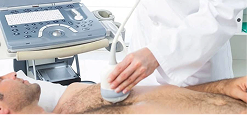
Dr. R. Padmanabhan Iyer
Echocardiography
A specialized cardiac ultrasound that assesses the heart’s size, structure, function, and competence of its valves.
Duration
45 mins
Preparations
There is no preparation for an echocardiogram.
Expectations
Your blood pressure will be checked, and ECG leads will be attached to your chest. Ultrasound gel will be applied to your chest and the technologist will use an ultrasound probe to acquire the necessary imaging.
Results
The results of the echocardiogram will be reviewed and reported by a cardiologist. The final report will be sent to your family physician.
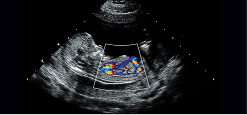
Dr. R. Padmanabhan Iyer
Fetal Echo
A fetal echocardiogram uses sound waves to create images of an unborn baby’s heart structure and function.
Duration
30 - 90 mins
Preparations
There is no preparation for an echocardiogram.
Expectations
The test is typically performed by a specially trained ultrasound sonographer, and the images are interpreted by a pediatric cardiologist who specializes in fetal congenital heart disease. A limited evaluation of the fetal heart is possible during regular obstetric scanning and is appropriate for women at low risk. The test takes approximately 45–120 minutes depending on the complexity of the fetal heart.
Results
Our cardiologist will discuss the results of your test. If the test is normal, no cardiac abnormalities were found. You will continue with routine pregnancy care and testing.
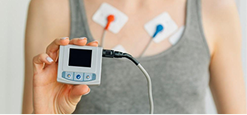
Dr. R. Padmanabhan Iyer
Holter Monitoring
A Holter monitor is a small, wearable device that keeps track of your heart rhythm. Holter Monitor will record longer to diagnose arrhythmias.
Duration
15 mins
Preparations
Wear loose & comfortable 2-piece outfit. No shower during the duration of test.
Expectations
This test uses a portable device that you wear, to make a continuous recording of your heart rate and rhythm as you go about your daily routine. Your technologist will provide instructions on how to wear and remove the device. Bring a list of all your medications to your appointment. Wear comfortable clothing and please arrive 15 minutes before your scheduled appointment. If you have a hairy chest, you may opt to shave in advance.
Results
You’ll be asked to keep a diary of all your daily symptoms while you’re wearing the monitor so that symptoms can be correlated with what is captured on the monitor.
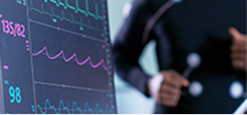
Dr. R. Padmanabhan Iyer
Exercise Treadmill Test (GXT)
Stress testing detects electrical changes in the heart when blood flow is compromised, aiding coronary disease management.
Duration
45 - 60 mins
Preparations
Wear loose clothing, running shoes, and a 2-piece outfit (no dresses). Physical activity will be involved. Please arrive 10 minutes early to register.
Expectations
An Exercise Stress Test typically lasts 30 to 40 minutes and begins with a cardiology technologist placing electrodes on your chest and abdomen, which may require shaving (for male patients) to ensure proper electrical contact. You will be given a gown and instructed to walk on a treadmill for as long as you can, increasing the test’s effectiveness. Throughout the procedure, ECG images are captured to monitor your heart’s activity. While generally considered safe, the test may occasionally trigger symptoms or arrhythmias.
Results
You will be advised to immediately notify the technologist if you experience symptoms such as chest pain, shortness of breath or light-headedness. The results will be reviewed and reported by a cardiologist. The final report will be sent to your family physician.
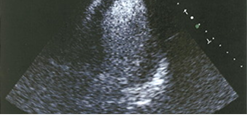
Dr. R. Padmanabhan Iyer
Contrast Echocardiography
A Contrast Echocardiogram uses an ultrasound enhancing agent injected into your vein to improve heart imaging clarity.
Duration
60 mins
Preparations
Wear loose & comfortable 2-piece outfit.
Expectations
An echocardiogram will be performed by a technologist. An IV will be inserted into your hand or arm by the technologist and contrast agent will be injected to better view the structures of the heart.
Results
The results of the contrast echocardiogram will be reviewed and reported by a Cardiologist. The final report will be sent to your family physician.
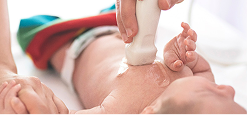
Dr. R. Padmanabhan Iyer
Pediatric Echocardiography
Pediatric echocardiography uses sound waves to create detailed heart images, diagnosing congenital defects without radiation.
Duration
45 - 60 mins
Preparations
Child may fast for 6-8 hours, lay supine with ECG electrodes, and wear a gown.
Expectations
The scan can last up to 60 minutes and your child will need to lie very still so good quality pictures can be taken. The echocardiographer will put some gel on your child’s chest area and then use a probe to send and receive ultrasound waves to make a picture.
Results
The results will be reviewed and reported by a cardiologist. The final report will be sent to your family physician.
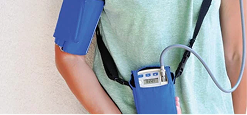
Dr. R. Padmanabhan Iyer
Ambulatory Blood Pressure Monitoring
Duration
10 - 15 mins
Preparations
Wear loose & comfortable 2-piece outfit. Wear belt. No shower during the duration of test. This test is not covered by OHIP, $70 charges.
Expectations
A blood pressure cuff and monitor will be attached to you. The monitor will check your blood pressure every 30 minutes during the day and every 60 minutes at night. The arm cuff will be wrapped snugly around your bicep, and the monitor secured to a waist belt or a shoulder strap.
Results
You’ll be asked to keep a diary of all your daily symptoms while you’re wearing the monitor so that symptoms can be correlated with what is captured on the monitor.
Want Our Team To Reach You?
About us
Why Choose Us?
We will contact at the earliest convenience.
Referral Made Simple for Expert Heart Care
Quick, easy referrals to get you the expert heart care you need, fast.
